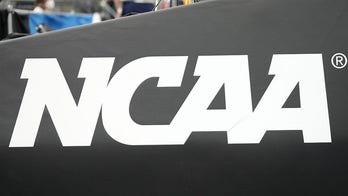Addressing Sex Discrimination in Women's Sports: The NCAA's Responsibility
- April 25, 2024 03:00pm
- 292

The growing popularity of women's athletics has shed light on a troubling issue: the persistent sex discrimination within the National Collegiate Athletic Association (NCAA). The NCAA's failure to address this discrimination has exposed the dark secrets hidden behind the bright lights of competition, including the overlooking of transgender inclusivity and the erosion of sex-based protections.
Women's athletics has experienced unprecedented growth in recent years, captivating audiences with thrilling performances and inspiring narratives. However, this newfound spotlight has also illuminated the systemic discrimination that plagues the industry, particularly within the NCAA, the governing body of college sports.
The NCAA has come under fire for its handling of transgender inclusion in athletics. In 2022, the organization awarded the Women's National Championship trophy to Lia Thomas, a male swimmer who identified as transgender. This decision sparked widespread debate and ignited concerns about the fairness and integrity of sex-based competitions.
Despite the public outcry and overwhelming support for maintaining sex-based protections, the NCAA has remained largely silent on the issue. Its inaction has sent a troubling message that it is willing to sacrifice the rights of female athletes in the name of inclusivity.
Critics argue that the NCAA's failure to address transgender inclusion is eroding the foundation of women's athletics. They fear that allowing individuals to compete based on their gender identity, rather than their biological sex, will create an unfair advantage and undermine the hard-fought gains made by female athletes.
The NCAA's inaction is not limited to transgender inclusion. It has also been accused of ignoring other forms of discrimination against female athletes, such as unequal access to scholarships, resources, and facilities. This systemic discrimination has created an environment where female athletes are often undervalued and underappreciated.
The NCAA has a responsibility to ensure that all athletes are treated fairly and have an equal opportunity to compete. Its failure to address sex discrimination not only harms individual athletes but also damages the integrity of women's sports as a whole.
It is time for the NCAA to take a stand against discrimination. The organization must develop clear and consistent policies that protect the rights of all athletes, regardless of their gender identity or biological sex.
The NCAA must also work to educate its members about the importance of sex-based protections and the dangers of discrimination. It must create an environment where female athletes feel respected, valued, and empowered.
Addressing sex discrimination in women's sports is not an easy task, but it is a necessary one. The NCAA must be willing to confront these issues head-on and work towards creating a more just and equitable environment for all athletes.
The future of women's sports depends on the NCAA's willingness to take action. It is time for the organization to live up to its mission of promoting and protecting the rights of all student-athletes. By addressing sex discrimination, the NCAA can ensure that women's athletics continues to thrive and inspire generations to come.
Related articles
-
 Ryan Garcia Apologizes for Racist and Anti-Muslim Comments, Announces Entry into Rehab
Boxer Ryan Garcia expresses regret for his controversial statements, acknowledges insensitivity, and seeks professional help for undisclosed...
Ryan Garcia Apologizes for Racist and Anti-Muslim Comments, Announces Entry into Rehab
Boxer Ryan Garcia expresses regret for his controversial statements, acknowledges insensitivity, and seeks professional help for undisclosed...
- 06 Jul 2024
-
 Paul Skenes: The New Ace Leading the Pittsburgh Pirates to Success
Pittsburgh Pirates' top prospect Paul Skenes has lived up to the hype and more, becoming one of the best pitchers in the game. His remarkable start...
Paul Skenes: The New Ace Leading the Pittsburgh Pirates to Success
Pittsburgh Pirates' top prospect Paul Skenes has lived up to the hype and more, becoming one of the best pitchers in the game. His remarkable start...
- 06 Jul 2024
-
 Snoop Youth Football League: The Birthplace of NFL Draft Prospect C.J. Stroud
Before becoming a dominant force in the NFL, quarterback C.J. Stroud honed his skills in the Snoop Youth Football League founded by Snoop Dogg.In the...
Snoop Youth Football League: The Birthplace of NFL Draft Prospect C.J. Stroud
Before becoming a dominant force in the NFL, quarterback C.J. Stroud honed his skills in the Snoop Youth Football League founded by Snoop Dogg.In the...
- 06 Jul 2024
-
 Tennis Player Jasmina Tinjić Banned Six Years for Match-Fixing
The International Tennis Integrity Agency (ITIA) has suspended Jasmina Tinjić for six years for allegedly fixing matches, admitting to 23 breaches of...
Tennis Player Jasmina Tinjić Banned Six Years for Match-Fixing
The International Tennis Integrity Agency (ITIA) has suspended Jasmina Tinjić for six years for allegedly fixing matches, admitting to 23 breaches of...
- 06 Jul 2024
-
 Aaron Boone Defends Trent Grisham After Error Draws Boos From Yankees Fans
despite the error, Boone praised Grisham's Gold Glove-caliber play and said he wants him to continue playing the game with the same relaxed, easy...
Aaron Boone Defends Trent Grisham After Error Draws Boos From Yankees Fans
despite the error, Boone praised Grisham's Gold Glove-caliber play and said he wants him to continue playing the game with the same relaxed, easy...
- 06 Jul 2024
-
 Stars Shine Bright at Rubin's White Party
The Hamptons played host to a star-studded Fourth of July celebration as A-list celebrities flocked to Fanatics CEO Michael Rubin's annual white...
Stars Shine Bright at Rubin's White Party
The Hamptons played host to a star-studded Fourth of July celebration as A-list celebrities flocked to Fanatics CEO Michael Rubin's annual white...
- 06 Jul 2024

Leave a comment
Your comment is awaiting moderation. We save your draft here
0 Comments
Chưa có bình luận nào